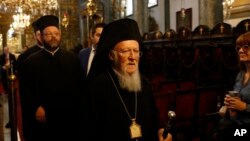The head of global Orthodox Christianity said Thursday that he would recognize Ukrainian churches as independent from the Russian Orthodox Church, sparking celebration in Kyiv and outrage in Moscow.
The decision, after a three-day synod chaired by Ecumenical Patriarch Bartholomew I in Istanbul, granted recognition to the leader of the church as independent from the Russian organization.
The decision was a victory for Ukraine as it struggles to keep Moscow at bay since the 2014 annexation of Crimea and Russia's continued support for separatists fighting against Kyiv in the east.
"This is a victory of good over evil, light over darkness," Ukrainian President Petro Poroshenko said. Poroshenko had campaigned for independence.
The Russian church, the world's largest Orthodox collective, condemned the decision.
"With its actions, Constantinople is crossing a red line and catastrophically undermines the unity of global Orthodoxy," said Alexander Volkov, a spokesman for Russian church leader Patriarch Kirill. He warned that if Bartholomew I proceeded to grant autonomy, the Moscow Patriarchate would no longer recognize the Istanbul leader.
Analysts said the move was as much about Ukrainian nationalism as it was about ecclesiastical hierarchy.
"It wasn't something that you spent a lot of time thinking about [before 2014]. You went to the church in your neighborhood, or where there was a priest you liked, or whatever it was," said Jeffrey Mankoff, deputy director of the Center for Strategic and International Studies' Russia and Eurasia Program. "It wasn't really a question of identity, which is true of a lot of things in Ukraine before 2014."
The church in Ukraine has been tied to the Moscow Patriarchate for hundreds of years. But many Ukrainian parishes are rejecting the Moscow Patriarchate and have formed two separate churches that are pushing for recognition as a self-governing institution. There are currently three different Orthodox bodies in the country: the Ukrainian Orthodox Church tied to Moscow, the Ukrainian Orthodox Church of the Kyivan Patriarchate, and the Ukrainian Autocephalous Orthodox Church.
Kurt Volker, the U.S. special representative for Ukraine, warned against any violence stemming from Thursday's decision.
"The Ukrainian people should be respected for their religious freedom and it is a shame that other countries would have a view on trying to stop that," Volker told reporters ahead of the announcement.




